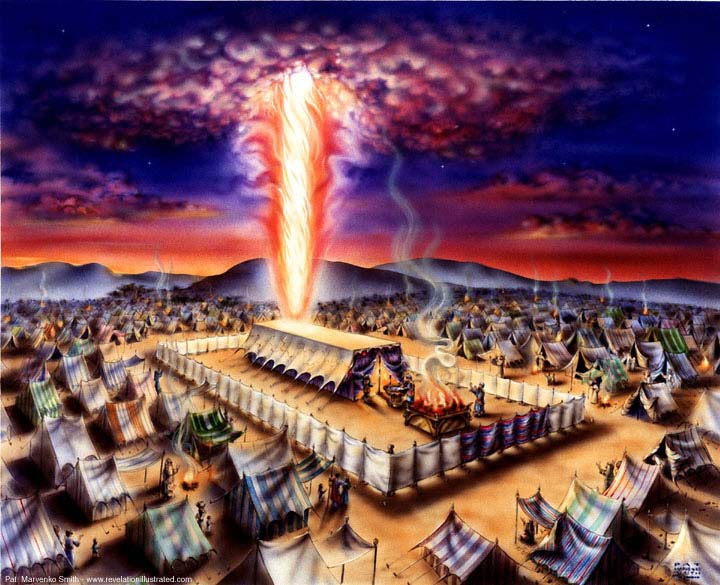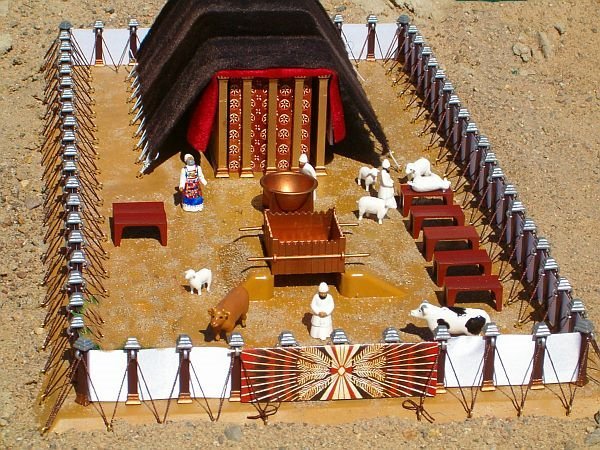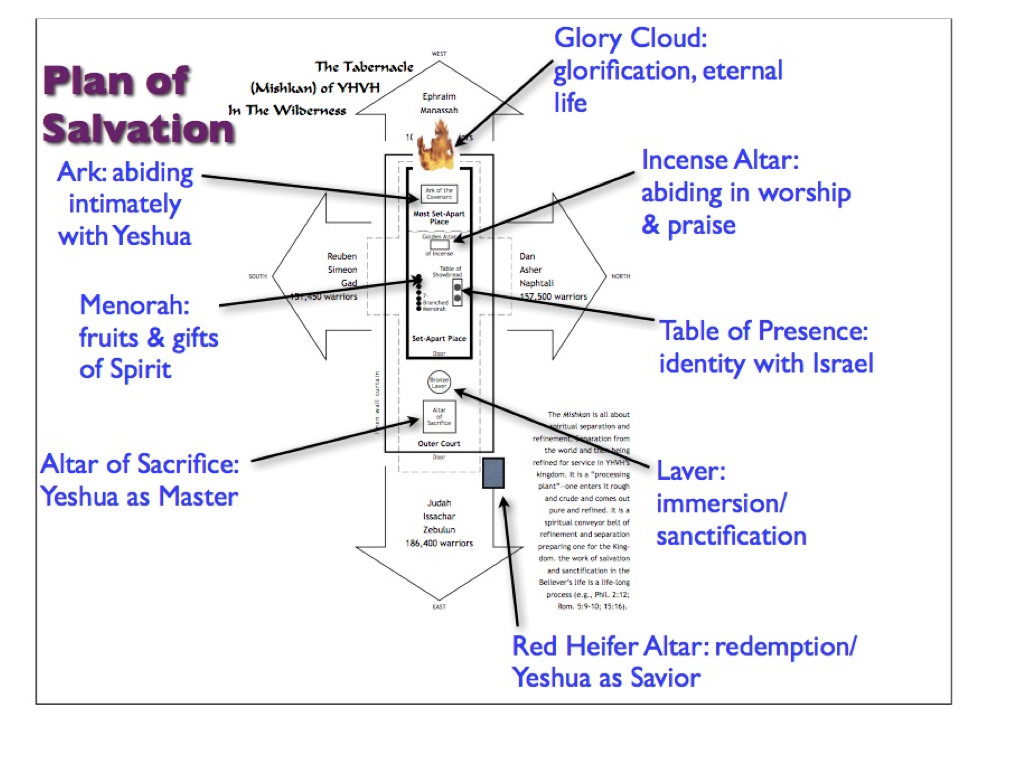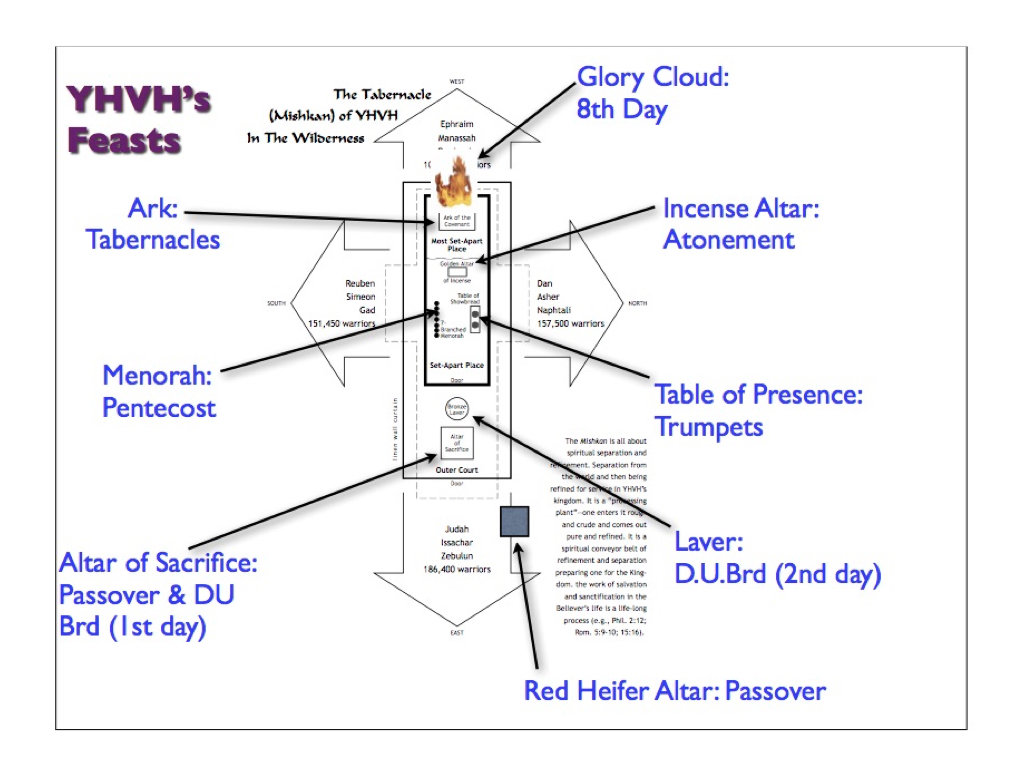Category Archives: Bible, General
The Book of Psalms—Introduction, Overview and List of Topics
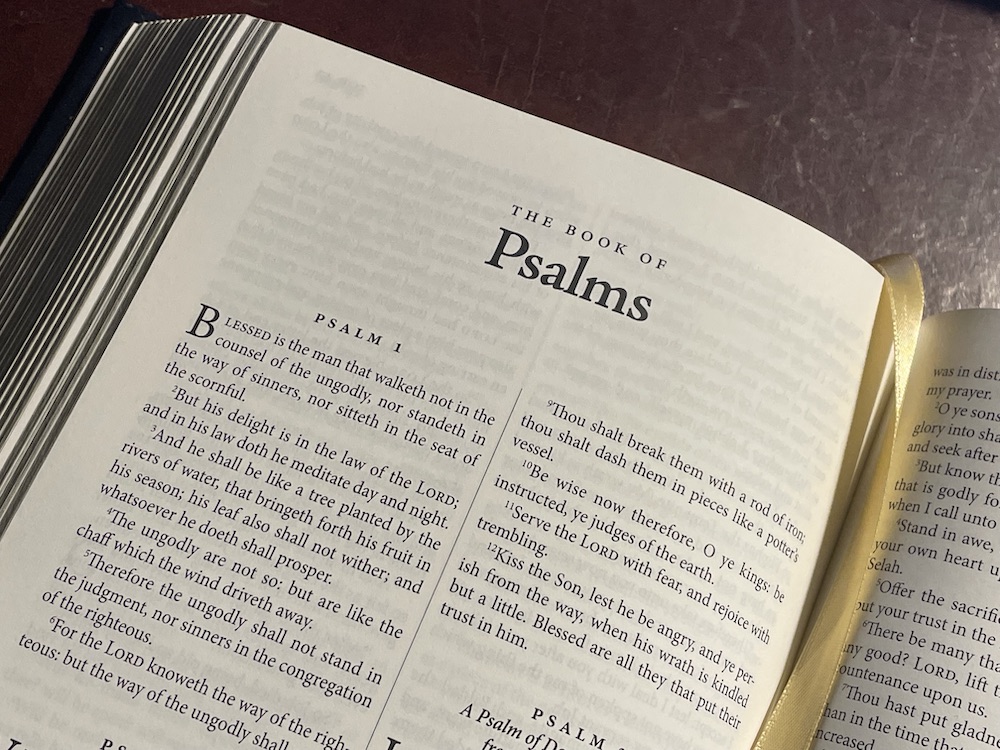
Introduction to the Psalms
Name of the Book
The Hebrew name for Psalms is Sepher Tehillim meaning “Book of Praises.” The word psalm is the Hebrew word mizmor meaning “melody” and derives from a word to mean “to sing, sing praise, make music.” The English word psalm derives from the Greek word psalmos meaning “a song sung to harp music.”
The Nature of the Book
The Book of Psalms is a collection of devotional materials including prayers, poems, and hymns some of which were set to music. Worship and praise of Elohim through music is a unifying aspect of this book. The psalms include songs of thanksgiving, hymns of praise, psalms of repentance and confession, psalms which invoke curses upon one’s enemies, psalms sung by pilgrims en route to Jerusalem, and messianic psalms.
Authors of the Psalms
This book contains psalms by at least six authors. David wrote 73 psalms (according to the titles of the psalms) and two others are ascribed to him in the Testimony of Yeshua (Ps 2, see Acts 4:25 and Ps 95, see Heb 4:7). Asaph either wrote or was responsible for preserving 12 psalms (Pss 50 and 73 through 83). The sons of Korah wrote 11 psalms (Pss 42, 44 through 49). Solomon composed two psalms (Pss72 and 127), while Etham wrote Psalm 89, Moses authored Psalm 90 (and possibly Ps 91), and Heman (Ps 88). Several Psalms have no designated author.
Categories of Psalms
- The psalms can be group into five categories.
- Didactic and wisdom psalms that give instruction (e.g., Ps 119).
- The Messianic psalms containing prophecies relating to the Messiah (e.g., Ps 22).
- The imprecatory psalms where the servant of Elohim pleads his case before the Almighty pleading for justice for the righteous and punishment upon the wicked (e.g. Ps 109).
- Penitential psalms expressing the feelings of the repentant heart but also the desire for spiritual cleansing (Pss 32; 38; 51;102; 130; 143).
- Psalms of praise, worship and thanksgiving.
- Other classifications of Psalms include
- Psalms of degrees or ascent (i.e., Pss 120–134). These are psalms that were sung on special occasions as the priests were ascending the steps of the temple, or that were sung as the Israelites were going up to Jerusalem to celebrate the yearly biblical pilgrimage feasts (i.e. Passover and the Feast of Unleavened Bread, the Feast of Weeks, the Feast of Tabernacles).
- The miktam (or michtam) psalms (Pss 16; 56–60). Though the meaning of the term michtam is unclear, it seems to refer toa psalm that is considered as precious as stamped gold.
The Five Books Within the Psalms
According to Jewish tradition, the Book of Psalms can be divided into five smaller books or sections. They are,
- Book One: Pss 1–41
- Book Two: Pss 42–72
- Book Three: Pss 73–89
- Book Four: Pss 90–106
- Book Five: Pss 107–150
Scholars aren’t sure why Psalms is so sub-divided. One theory is that the five sections correspond to the five books of the Torah (or Pentateuch). Or they may simply be individual collections of psalms that were eventually combined to form the larger book we now have.
The first three books end with the word, “Amein and amein” (the only places in the Scriptures where this double-amein phrase occurs. The last two books end with the phrase, “Praise YHVH.”
A Topical Index to Key Subjects in the Psalms (and elsewhere)
- Afterlife, The— Job 14:14–15; 19:25–27; Pss 6:5; 42:2; 50:4; 73:24; 17:15; 71:20; 90:10; Prov 14:32; Eccl 3:21; 12:7
- God Bubble— Pss 91:1; 119:114
- Fear of YHVH— Ps 34:9; Prov 1:7
- Healing— Pss 41:3; 103:3
- Hunger, Spiritual— Pss 42:1; 63:1
- Leanness of Soul— Pss 106:15; 107:9
- Lifter of My Head— Pss 3:3; 27:6; 110:7
- Name of YHVH— Ps 20:1
- Pit, The— Pss 28:1; 40:1; 69:1ff
- Prayer, Answered— Pss 3:4; 4:3; 6:9; 9:12; 20:6; 34:4, 6, 15, 17; 55:17; 65:2; 66:19; 69:33; 86:12; 99:6; 109:7; 118:5; 145:18, 19; Prov 15:29; Isa 55:8; Jas 5:16;
- Prayer, Unanswered— Pss 66:18; 35:13; 99:6–8; 109:7; Prov 15:8, 29; 28:9; Isa 1:15; 1 Pet 3:12
- Repentance— Job 42:6; Ps 51:38
- Resurrection of the Saints, The— Job 14:15; 19:26–27; Pss 16:10; 17:15; 50:4–5; 71:20; 73:24; 102:17; 118:5; Dan 12:2; 1 John 3:1–2
- Revelation, Divine— Pss 13:3; 25:14; 36:1; 63:2; 77:13; Prov 3:32; 4:18; 20:27;
- Sacrifice, Higher— Pss 4:5; 20:6; 27:6; 35:8–15; 51:17; 107:22; 116:17; 119:108; Prov 15:8; 21:3; Jer 17:26; 33:11; Hos 6:6; 14:2; Jon 2:9; Mal 1:11; Matt 9:13; 12:7; Rom 12:2; Eph 5:2; Phil 2:17; 4:18; Heb 9:26; 13:15; 1 Pet 2:4 cp. Ps 113:11; 141:2; Rev 5:8; 8:3
- Sacrifice of Praise— Ps 27:6
- Tabernacle Holy of Holies/Throne Room of Elohim— Ps 77:13
- Waiting on YHVH— Pss 25:3, 5; 27:14; 37:7, 34; 39:7; 59:9; 52:9; 62:5; 69:3, 6; 104:27; 106:13; 123:2; 130:5; 145:15; Prov 20:22; Isa 8:15; 40:31; Lam 3:25; Hos 12:6; Mic 7:7; Hab 2:3; Zeph 3:8
- Warfare, Spiritual— Deut 1:30; 20:1; Pss 91:1ff; Ps 3:1–8; 18:29
- Woman, A Contentious—Prov 19:3; 21:19; 24:24; 27:15
- YHVH, The Name— Ps 20:1
- Yeshua (a list of where the Hebrew word Yeshua appears in the OT)— Gen 49:18; Exod 14:13; 15:2; Deut 3:15; 1 Sam 2:1; 14:45; 2 Sam 10:11; 22: 51; 1 Chron 16:23; 2 Chron 20:17; Job 13:16; 30:15; Pss 3:2, 8; 9:14; 13:5; 14:7; 18:50; 20:5; 21:1, 5; 22:1; 28:8; 35:3, 9; 42:5, 11; 44:4; 53:6; 61:1, 2; 67:2; 68:19; 69:29; 70:4; 74:12; 78:22; 80:2; 88:1; 89:26; 91;16; 96:2; 98:2, 3; 106:4; 116; 13; 118:14, 15, 21; 119:123, 155, 166, 174; 140:7; 149:4; Isa 12:2, 3; 25:9; 26:1, 18; 33:2, 6; 49:6, 8; 51:6, 8; 52:7, 10; 56:1; 59:11, 17; 60:18; 62:1; Jon 2:9; Hab 3:8 (The word Yeshua occurs 78 times in the OT. Mathematically, this is 7 and 8 signifying perfection and new beginnings or eternity, or 7 x 70 + 8 signifying perfect law and order plus new beginnings or eternity.)
- YHVH Hates— Pss 5:5; 11:5
- YHVH, The Voice of— Ps 29:3
Hebrew Words of Praise Found in the Psalms
- Barak means “to bless YHVH as an act of adoration by kneeling (literally means ‘breaking the knee’).”
- Basar means “to be cheerful, to announce glad news.”
- Halal means “to be boastful, to shine, to make a show, to be thunderously foolish, to rave, to celebrate; denotes a tremendous explosion of enthusiasm in praising YHVH.”
- Nagad means “to declare, stand boldly, to announce.”
- Qara means “to cry out, to proclaim, to cry out to YHVH, to proclaim YHVH’s name.”
- Ruah means “to split the ear with sound, shout for joy, to make a joyful noise, to sound the victory.”
- Rum means “to extol, to lift up, to celebrate, to honor, to exalt.”
- Shabach means “to address in a loud voice, to shout, to glorify, to give praise to YHVH with a loud voice or shout.”
- Tehillah means “a laudation or hymn.” From the root of hallal.
- Todah means “adoration, giving thanks, giving thanks, a choir of worshippers.” From yaddah meaning “an extension of the hands.”
- Yadah means “to hold out the hands, to revere or worship with extended hands. The root of yad means “an open hand.”
- Zaman means “to touch the strings or parts of a musical instrument, to make music accompanied by the voice; that is, to celebrate with songs and music; to give praise, to sing forth praises and psalms.”
Was the New Testament Originally Written in Aramaic? NO!
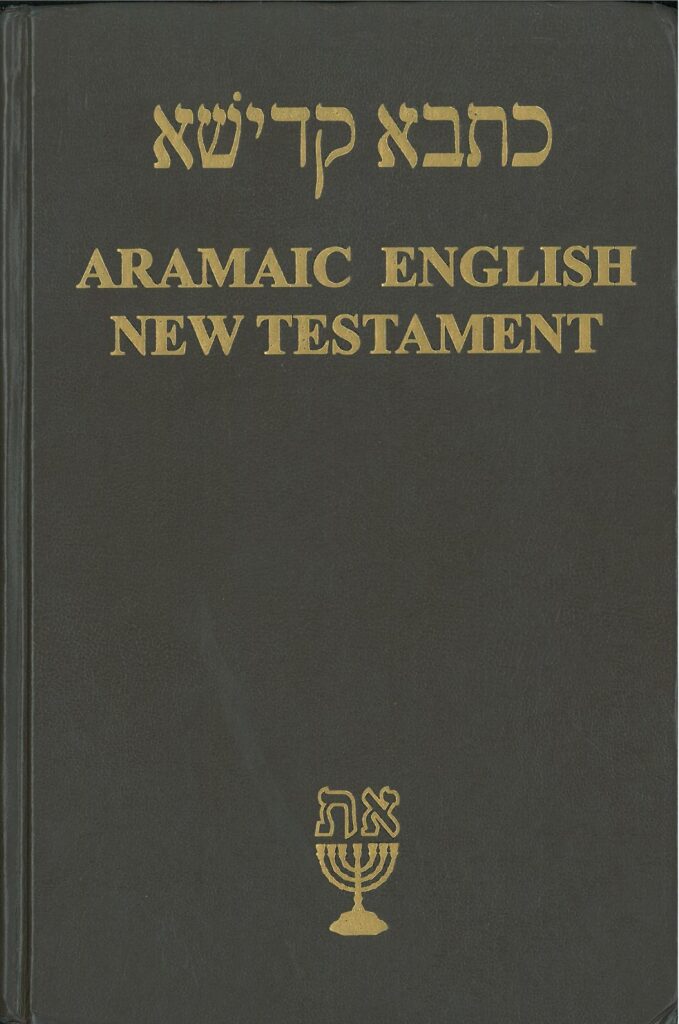
In this discussion, Nehemia Gordon gives proof that the Aramaic Peshitta New Testament was translated from the Greek, not the other way around. For the video version of Nehemia Gordon’s discussion with Michael Rood, go to:
The following is the transcript of this discussion between Nehemia Gordon and Michael Rood:
Michael: And then I was talking to him about the Peshitta, he said, “We don’t use the Peshitta. The Peshitta, Aramaic text…”
Nehemia: Let me stop you. This is the head scholar of the Aramaic…
Michael: Syrian Orthodox…
Nehemia: Aramaic-speaking church in Jerusalem.
Michael: And the head scholar of the Syrian Orthodox Church.
Nehemia: In Jerusalem.
Michael: In Jerusalem.
Nehemia: Wow.
Michael: He is the top of the entire school, okay? He is an old man, he’s in his 80s. And he said, “We don’t use the Peshitta. The Peshitta is a later Aramaic translation from the Greek.
Nehemia: Look, I’ve spoken to scholars about this. In fact, I sat down with a scholar at the Hebrew University of Jerusalem and I told him, “You know, people have suggested that this Aramaic Peshitta is the original Aramaic that Jesus, that Yeshua, spoke and taught, and the Greek is a translation from the Aramaic,” and this guy was an Aramaic scholar, specifically of Syriac-Aramaic, which the Peshitta’s written in. Actually, when I walked into his office, he was looking at this giant… it was like this big, this dictionary of Peshitta Aramaic. And I asked him for some proof, so I said, “Well, how can we know? You’re telling me…” I mean, look, people will tell you that this Hebrew Matthew, that this isn’t the original Matthew, it was written in Greek, so why would I believe you when you tell me that the Aramaic isn’t the original? The Greek is the Aramaic? I said, “I need some proof. I can’t trust your word for it.”
And this was just for me, I don’t think I’ve ever even shared this. I really just wanted to know for myself. And so, he started off, he told me a bunch of linguistic things about how the Aramaic that Yeshua spoke was completely different than the Aramaic that the Peshitta is written in. It’s a completely different dialect of Aramaic. He said, “It would be like the difference between German and Dutch.” Dutch is the language they speak in Holland. I don’t speak either of those languages, I read a little German. German is called in their language, “Deutsch”, and you have “Dutch”, which is the language of Holland. Originally, they were obviously a single language, but now they’re incomprehensible to one another, unless you’re from the border area there. But the German people can’t understand Dutch. But they’re that similar. The Aramaic that Yeshua spoke and the Aramaic the Peshitta is written in are similar, but they’re also different enough to be, essentially, he said if it was any other language, they’d be called two different languages. But for Aramaic, we consider all these different, very vastly different dialects, one language.
And he gave me specific examples I won’t go into, but you could look up at any Peshitta grammar, it’ll tell you what those differences are. They’re profound differences. But then he gave me some really powerful examples. I’m like, “This is it, it’s the end of the story. We’re done.” I wanted to know, and he answered me. Here’s an example of one of the things he showed me.
So, the Hebrew word for “covenant” is “brit”. Now, in American Jewish-speak we call it a “bris”, and that’s because the Hebrew letter Tav when it has a dot in it, it’s a tuh. When it doesn’t have a dot, it’s a thuh or in some dialects, suh. So, “brit, bris, brees.” It’s the same word, different pronunciations of Hebrew. So, the word is “brit” or “bris”, like I had my “bris” on the eighth day, the covenant, the circumcision, in that case.
Genesis 6:18 says, “I will establish My covenant with you.” The word is “diatheke”. “Diatheke” is the Greek word for “covenant”. Aramaic has a perfectly good word for covenant. The Aramaic word for covenant is “kiyam”. It comes from the Hebrew word, the Semitic root, “lakum, lehakim”, “to establish”. That word also appears, a form of that, in the Hebrew connected to covenant, but the actual word for covenant is “brit”, and you say, “lehakim brit”. And so, Aramaic takes that and it’s “kyam”, that’s the word for “covenant”.
So let’s look in the Targum, that’s the ancient Jewish translation of the Tanakh. And there, in the very same verse, Genesis 6:18 it says, “Ve’akeim yatkiami,” “And I established My kiyam,” “My brit, My covenant”. If you looked in the Peshitta, if it was the original Aramaic, you would expect the word “kiyam” to be used all over the place as the word for “covenant.”
Michael: Yeah, look in the…
Nehemia: In the New Testament.
Michael: Right, the New Testament, in Matthew, etc.
Nehemia: Right. So Matthew 26:28, I’m just choosing a verse here that has the word “covenant”. It says, Yeshua says here, “For this is My blood of the covenant.” Okay, so in the Greek, it has for covenant, “diatheke”, same word as when it translated “brit” in the Tanakh. So, we have Hebrew, “brit”, Aramaic, “kyam”, Greek, “diatheke”. What do you think you have in the Peshitta? The Peshitta’s Aramaic. Some people say it’s the original Aramaic that Yeshua spoke. Surely, you have the word “kiyam”, the Aramaic word for “brit”. And that would be a great word, because also, you get from that the word “lakum”, which means “to rise up”.
So, if the word “covenant” were connected to “rise up”, and Yeshua’s saying, “This is the blood of My rising up, of My covenant,” that would be a powerful message. But in the Peshitta, you don’t have “kiyam”, you have “diatheke”.
Michael: It’s Greek.
Continue readingNatan’s Commentary on 1 Samuel 21 to 29

1 Samuel 21
1 Samuel 21:6, Showbread.David likely had not eaten food for the better part of four days (three days hiding from Saul in the wilderness and the fourth day fleeing to Nob, 1 Sam 20:19 cp. 1 Sam 21:1), and so he was famished. Yeshua makes reference to this incident in Matthew 12:3 when justifying his picking grain and eating it on the Sabbath. Harvesting grain on the Sabbath is forbidden in the Torah, even as eating of the showbread was forbidden for anyone other than the priests (Exod 25:30; Lev 24:5–9). Yet, Yeshua demonstrated that, even as the Torah allows an ox to be pulled out of a ditch on the Sabbath to save the ox’s life, so it was allowable for him to “harvest” grain on the Sabbath to stave off hunger, even as David ate the showbread when he was famished. (See note at Matthew 12:1–14 for a full discussion of this subject.)
1 Samuel 24
1 Samuel 24:4, Corner of Saul’s robe. Corner in Hebrew is kanaph meaning “wing, extremity, edge, border, corner of a garment.” The kanaph was the same part of a garment to which YHVH instructed the children of Israel to attache the tzitzit or blue tassel (Num 15:37–41). Thus, in can be deduced that if Saul were Torah-obedient, then a tzitzit would have been attached to the corner of Saul’s garment. This tzitzit that David cut off was symbolic of Saul’s covenantal relationship and devotion to YHVH.
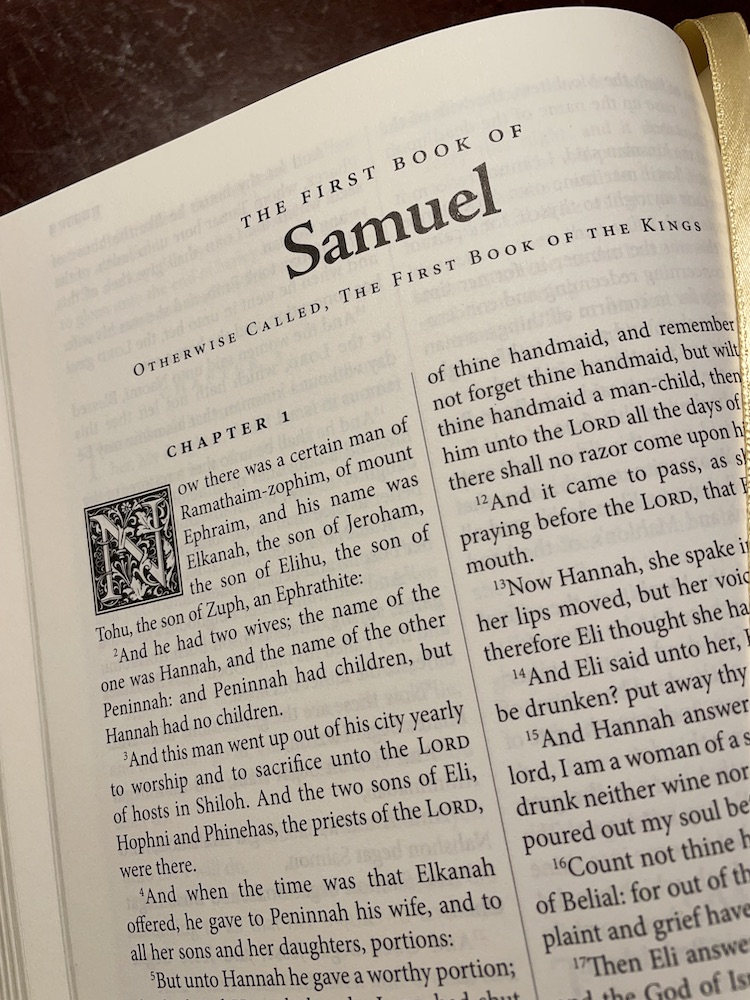
1 Samuel 24:6, 10, YHVH’s anointed. Interestingly, David was also YHVH’s anointed—as much so as Saul. However, Saul occupied the throne at the time, and David didn’t, so he respected Saul’s position until such time as YHVH removed him from the kingship. David wasn’t one to presume, rush things or to usurp any authority not given him. He was patient to wait for YHVH’s timing, including the time when the throne would his according to Samuel’s prophecy.
1 Samuel 24:16–21 (also 26:25), You are more righteous than I. Here King Saul prophesies that David will succeed him as king over Israel, and that he will do go great things and prevail. There were other instances of Saul coming under a spirit of prophecy (e.g., 1 Sam 10:10–11; 19:23–24). Saul was capable of hearing the voice of Elohim, but because of unrestrained carnality, a spirit of rebellion (15:23), and his inability to submit to the will of Elohim, he was spiritually conflicted. Clearly, YHVH was not in his heart (1 Sam 15:15, 21, 30). Within him was a constant struggle between doing the will of Elohim and his own will. The latter usually won out, because he had not unconditionally surrendered his will to YHVH (15:23, 26). Saul was swayed more by popular opinion than by the Word of Elohim (1 Sam 1 Sam 15:24, 30). Saul was able to worship Elohim (15:31), but was spiritually weak and not able to obey the Word of Elohim (15:23, 26). It is impossible to love and worship Elohim without obeying his Word. Let’s be honest. Most of us are at least a little if not a lot like Saul in these areas.
Yeshua declared that those who love him will obey his commandments or his Word (John 14:15). James wrote that the demons even tremble before Elohim (Jas 2:19), even though they are in rebellion against the Word of Elohim. Faith, works and obedience must accompany the worship and fear of Elohim (Jas 2:14–26). Though Saul paid lip service to YHVH, his heart was far from him. He obeyed when it was convenient and expedient to him. Isaiah similarly spoke of the rebellious Israelites who drew near to YHVH with their lips, but in reality, their hearts were far from him (Isa 29:13). Yeshua quoted and applied this verse to the hypocritical and rebellious religious leaders of his day (Matt 15:6–7).
In a certain sense, Saul is spiritual type of Christianity, which teaches and obeys the Torah-Word of Elohim only in part, and otherwise follows their own anti-Torah belief systems.
1 Samuel 25
1 Samuel 25:1, Samuel died. Samuel was able to die in peace, since his ultimate mission was now complete. David’s kingship was safe, since Saul had just ceased pursuing David and admitted that David would be king.
1 Samuel 27
1 Samuel 27:3, So David dwelt with Achish. Why would the Philistines now accept David into their midst after he had fought against and killed so many of them as a general in Saul’s army? They accepted David because he was now an enemy of Saul. It was a political move on their part. This is a classic case example of the saying, the enemy of my enemy is my friend.
1 Samuel 28
1 Samuel 28:15, 19 Samuel. Was this actually Samuel, and does this scripture passage prove that Samuel’s soul was immortal, as many in the mainstream Christian church teach, thus proving the doctrine of the immortality of the soul?
In this passage of Scripture, the witch of Endor is acting as a spiritist or medium—a necromancer. A demon is speaking and is posing as the dead Samuel. Yes, this demon looked and sounded like Samuel, but it wasn’t. Even though Scripture calls this demonic impersonator Samuel, this was written from the human perspective, as many Scriptures are, since the Bible is often quoting humans who are speaking and writing from their own perspective based on their limited knowledge, and not necessarily stating truth in the full sense of the word. This is where the astute and Spirit-led Bible student will rightly divide the Word of Elohim, so that they don’t make it say things that are contrary to spiritual truth or contradict other scriptural truths. Moreover, do you not think that the sovereign, all powerful Elohim can’t use anyone or anything to communicate to anyone in any way he chooses—in this case to King Saul? After all, he used a donkey to speak to Balaam. Yeshua said that Elohim could raise up rocks to praise him. Elohim used lying spirits to prophesy lies to King Ahab through the mouths of his false prophets (1 Kgs 22:19–23). Know ye not that even Satan can transform himself transforms himself into an angel of light. (2 Cor 11:14)?
In verse 19, the demon posing as Samuel declares that Saul and his sons will be with him. If one believes this is Samuel speaking, and believes that the soul is immortal and goes to heaven when a saint dies, then it would be logical to assume that Saul and his sons would be going to heaven. However, if this is a demon speaking, where is he speaking from? Yes, the demon is saying that Saul and his sons will be with the him wherever he happens to be—probably in what the Bible refers in several place to as the pit, abyss or, in the Greek, tartaroos (2 Pet 2:4)—the place where the demons are being held in prison awaiting the final judgment.
1 Samuel 28:24, Calf in the house. In ancient times, in the average Israelite home, animals lived in the house with the people.
1 Samuel 29
1 Samuel 29:6, As YHVH lives. Here Achish the Philistine is invoking the name of YHVH. Why would a heathen whose people worship Dagon (the wheat harvest or fish god of fertility)call on the name of YHVH, the Deity of the Hebrews? Ancient history shows that the people of Canaan in biblical times worshipped a pantheon of deities including Ba’al, Asherahm, Berith, Chemosh, Dagon, El, Elyon, Moloch, YHVH and many others, whereas the Israelites worshipped only YHVH Elohim. The biblical record reveals that at one time, the inhabitants of the earth knew the name of YHVH, and called on him (Gen 4:26). This doesn’t mean, however, that they remained faithful to the truth he had revealed to them through his servants (e.g., Adam, Enoch, Noah, or Shem) even though the use of the name YHVH continued. In our day, the use of the names God, Jesus, Christ can mean many things to different people, and their use may have little or no relevance to what the Scriptures reveal about the Godhead or what he requires in the way of obedience.
Natan’s Commentary on 1 Samuel 16 to 20

1 Samuel 16
1 Samuel 16:5, Then he sanctified/consecrated. Heb. qadash/שﬢק meaning “prepare, dedicate, be separate, be set apart, to be honored, be treated as sacred. According to the TWOT, qadash connotes that which belongs to the sphere of the sacred, and is thus distinct from the common or profane. As a verb, it refers to the act which this distinction is made.
What was involved in this process of sanctification? We may gain a clue from Exodus 19 where YHVH tells the Israelites to sanctify themselves at the foot of Mount Sinai in preparation for their encounter with him as they receive the ten words/commandments and enter into a spiritual marital relationship with him (Ezek 16:8–12). As part of the sanctification process, Moses instructed the people to wash their clothes and to restrain from sexual relations with their wives (Exod 19:10,15,22), and to establish strict protocols with regard to approaching YHVH (verses 12, 13, 21, 23, 24). In addition, YHVH established elaborate ceremonies for consecrating or sanctifying the Levites and priests in preparation for service in to him in the tabernacle (e.g., Exod 28:41; 29:44), the offerings (e.g., Exod 29:27, 36), the tabernacle furnishings (e.g., verse 37, 44; Lev 8:11) and the people (verse 44).
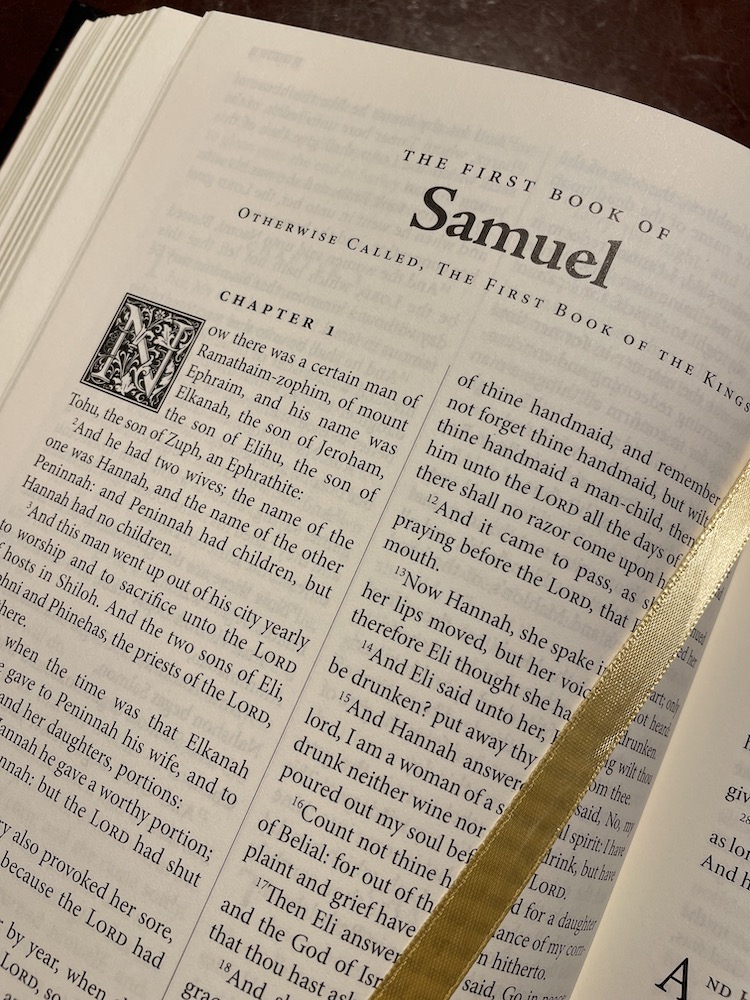
In brief, to become sanctified involves a process by which an individual or object is made ready and then set-apart to enter into the presence of or service to YHVH Elohim. When something or someone is made qadash, they are brought out of the sphere of the mundane or earthly and into that sphere which belongs to the divine or sacred.
1 Samuel 16:7, Outward appearance … heart. Scripture instructs the saint to make judgments on the basis of two things: the fruits or actions that proceed from one’s life (Matt 7:15–20) and on righteousness (John 7:24). Fruits involve analysis based on the fruit of the Spirit (Gal 5:16, 22–25), which is the evidence of one’s spiritual walk. Righteousness is defined by one’s obedience to YHVH’s Torah-Word (Ps 119:172). One’s outward appearance may be spectacular, but his heart may be dark and the fruits and actions of his life may be anything but good.
1 Samuel 16:11, The youngest…keeping the sheep. The youngest children in the biblical family often was consigned to tending the sheep. Once he grew older and stronger, his help was needed along side the father in more physically demanding work of tilling, sowing, and harvesting the crops (Manners and Customs, p. 148; Social World of Ancient Israel, p. 41).
1 Samuel 17
1 Samuel 17:26, 36. Uncircumcised Philistine. This was not an ethnic slur. Rather, to refer to someone as uncircumcised was a Hebraism that simply meant that one did not have a covenantal relationship with YHVH Elohim, and thus was out of relationship with him and not under his divine protection.
1 Samuel 17:34–35, When a lion…struck it. The shepherds rod was like a policeman’s club. It was made of hard wood with a knob at the end, or it had knob nails driven into it to make it a better weapon (Manners and Customs, p. 149).
1 Samuel 17:40, Five smooth stones. Goliath had four sons (2 Sam 21:22). David had a stone for Goliath and each of his four sons. Moreover, Israel is an extremely rocky land, thus “bullets” for slings are abundant.
1 Samuel 17:45–47, I come to you in the name YHVH of hosts. David recognized that this was more than a physical battle; it was a spiritual one. The Israelites were fighting the enemies of Elohim. As such, David summoned heaven’s help in defeating Goliath, and pitted the forces or hosts of heaven against the legions of demons that were empowering the Philistines by lifting up and having faith in the name or reputation of YHVH to help him to fight the enemy.
1 Samuel 18
1 Samuel 18:1, Jonathan loved him. Some perverted minds have attempted to see in this a homosexual relationship between Jonathan and David, thus justifying, in their minds, the sin of homosexuality. This is not only sad, but it is a sick twisting of the Scriptures. What these lost and lonely souls seem to miss is that there is a level of love that is totally altruistic, selfless and a self-sacrificing that can exist between two people that is totally non-sexual, and that can even far surpass sexual or romantic love. This is similar to the love that Elohim had for the world when he gave his Son as a sin sacrifice for it (John 3:16), and the love that he had for each of us while we were yet sinners (Rom 5:8), and the same love that one has when he lays down his life for another person (John 15:13). This is the same love that Yeshua had when he went to the cross for each of us (John 10:11, 15; Rom 5:6–8; Eph 5:2).
1 Samuel 18:10, The evil/distressing spirit from Elohim. As a form of judgment against his backslidden servants, YHVH at times sends out deluding evil (demonic) spirits in hopes to torment them (2 Thess 2:11; Ezek 14:3; Isa 66:4). In that they have rejected him and turned to rebellion (which is as the sin of witchcraft, 1 Sam 15:23), he will turn them over to the powers of the dark side where they can experience the full expression and corresponding consequences of their evil passions and sinful appetites. Under the spiritual delusion of tormenting spirits, perhaps the rebellious backslider will awaken to the reality of his fallen state and will repent and return to YHVH. Similarly, Paul turned over to Satan the man in Corinth who was engaged in sexual immorality “for the destruction of the flesh” resulting in the man’s eventual repentance and restoration to the body of believers in that city (1 Cor 5:1–13 cp. 2 Cor 2:5–13).
Saul…prophesied. Saul prophesied (Heb. naba). Naba can refer to the prophetic utterances of both true and false prophets. When Saul was under the influence of the Spirit of Elohim he prophesied by the Spirit. When under the influence of an evil spirit, he “raved” (NAS). Saul may be a picture of modern Torahless prophets in the Christian church who sometimes prophesy and sometimes rave out of their own emotions and carnal mindedness or from the influences of an evil spirit.
1 Samuel 19
1 Samuel 19:13, Image. Heb. terephiym is an idolatrous image.
1 Samuel 19:20–24, Saul and his servants prophesy. Though Saul and his servants were under the influence of an evil spirit, when they came under the influence of the Spirit of Elohim, they would prophesy by the Spirit. Many people in the Christian church claim to be prophets, though they are only walking partially in accordance with YHVH’s Torah-Word and partially following the rudiments of this world or pagan church traditions that violate the Torah-word of Elohim. These prophets are like Saul, who was at times under the influence of the spirit of this world or the dictates of their own hearts and at other times under the influence of the Spirit of Elohim. Like the carnal prophets who are condemned by Jeremiah, they prophesy a mixture of truth and error.
1 Samuel 20
1 Samuel 20:5, 18, 24, 27, 34. New moon. How did David know that the next day was new moon day? Was this because he was able to calculate ahead of time when the new moon was going to occur? No. The answer is quite simple. A lunar cycle lasts for 29.5 days. This means that some months will be 29 days long and some will be 30 days long, since it’s impossible to have half-days. How did David know that the next day would be the new moon day? Simply this. Biblical months are based on the lunar cycle. A lunar cycle can’t have more than 30 days. A lunar cycle month is either 29 or 30 days long. If one has reached day 30 of a month and the new moon still isn’t visible because the sliver is too faint to see, or because there’s cloud cover or haze blocking it from being seen, then the observer automatically knows that the next day, by default, will the first day of the next month. Sometimes one sees the new moon after 29 days. Sometimes it is seen after 30 days either because they sited it, or because, even though it wasn’t visible and since a month can’t have any more than 30 days, the next day (day 31, if you will) becomes the default start of the new month. Obviously, in the story of David, the new moon hadn’t been sited on day 30, and so he knew that the next day was, by default, the beginning of the new month.
The idea that, because the time between conjunction and visible sliver can last one to three day, proves that Saul was feasting or celebrating the new moon during this interval is speculation. Nothing in any Jewish historical sources that I have studied state either that the ancient Hebrews calculated the new moon from the conjunction, or that if they did they celebrated the interval time between the conjunction and the sliver. So when 1 Sam 20:27 and 34 speak of the second day of the month, we have to believe that they were feasting for a couple of days after the sliver was first spotted.
1 Samuel 20:41, Kissed [Heb. nashaq] one another. Nashaq means “to put together, kiss, to touch gently.” This is the same word used in Proverbs 27:6 referring to the deceitful or superficial kisses of an enemy (like the kiss of Judas, Yeshua’s betrayer), as well as the tender or affectionate kisses of lovers (Song 1:2; 8:1; Prov 7:13). The concept of touching gently can be seen in the use of this word where the wings of cherubim kiss or touch each other in Ezekiel’s vision (Ezek 1:3). Kissing as special sign of affection was common among family members (Ruth 1:1) and among fellow countrymen (2 Sam 15:5). It was also done as a sign of respect (1 Sam 10:1; 2 Sam 19:39). Even today in many parts of the world, friends greet each other with a kiss on the cheek. On four occasions, Paul closes his epistles with instructions for the saints who will be reading his letters to greet each other with a holy kiss (Rom 16:16; 1 Cor 16:20; 2 Cor 13:12; 1 Thess 5:26). If there is a “holy kiss”, then logic demands that there must be an unholy kiss as well. Because of the deep loving friendship and spiritual relationship that David and Jonathan shared, their kiss would have been one of mutual respect and affection, and not an unholy kiss.
Natan’s Commentary on Psalms 59 to 63

Psalm 59
Psalm 59:9, I will wait for you. When a righteous person suffers for righteousness sake (and not because of any sin he has committed, vv. 3–4), the saint, because of his strong scruples and sense of right and wrong, desires immediate justice upon his enemies. Yet because his life is in YHVH’s hands, he looks to the courts of heaven to render justice when the all wise and all knowing Almighty, who sees the end from the beginning and lives outside of time, determines is the best time to do so. For this reason, the saint must learn to wait on YHVH to avenge him for the wrongs committed against him.
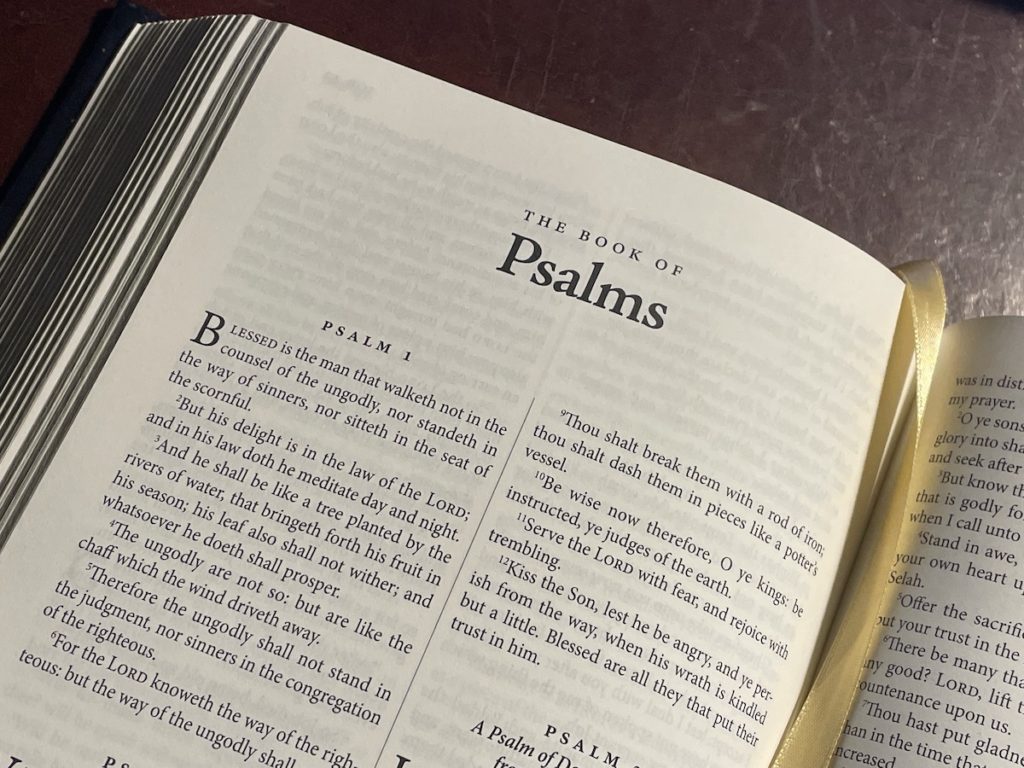
Waiting to see one’s desire upon one’s enemies (v. 10) is an aspect, though a difficult one, of the faith walk. Through it all, the saint never takes his eyes off of his merciful Elohim, who is his defense. He never loses his spiritual, heavenward focus and never ceases to sing praises his Creator every day (vv. 16–17).
The act of praising Elohim and expressing faith in the knowledge that heaven will ultimately render justice, even while one is in the midst of persecution at the hands of the wicked is a major differentiating factor between the saint and the heathen.
All humans suffer, but not all have the faith and hope that heaven will reward them in due time by seeing justice served on one’s enemies.
Never forget that the concept of “enemies” may encompass more than just other humans; it may include such things as suffering because of material and financial privation, trying circumstances, ill health and ultimately death, generational curses or simply the stress and duress of living in a fallen world that is under the control of the devil and his sinful minions.
Regardless of who our “enemies” may be, the saint is promised deliverance from them all in due time. This is because YHVH promises to “keep him in perfect peace, whose mind is stayed on [him], Because he trusts in YHVH]” (Isa 26:3).
Psalm 60
Psalm 60:12, Through Elohim. Sometimes YHVH avenges our enemies through us. If this is the case, we must make certain that we are fighting his wars, his way and on his terms, and not our way often out of our own impetuosity and wounded egos using our own methods and strength to accomplish our desires upon our enemies (see Zech 4:6; Ps 127:1).
Psalm 61
Psalm 61:2, Rock that is higher. When our heart affections and spiritual focus is on something that is higher, loftier and more solid and substantial than ourselves, then our focus will naturally be higher than ourselves and we will be elevated in all areas of our lives as a result.
Conversely, when our focus is on something that is at the same level or lower than ourselves, then we will sink to that level.
This is a fundamental difference between following or worshipping Baal (the world, flesh and the devil) versus following or worshipping Elohim: the former is the downward path that leads to spiritual death and separation from Elohim, while the latter is the upward path that leads to Elohim and eternal life in his presence.
The choice is ours as to which path we will take. Every day we are faced with many small and sometimes large decisions as to which direction we will go. Choose wisely and do the right thing by choosing the path that will bring blessing and life!
Psalm 61:4, Tabernacle…shelter of your wings. Over the mercy seat on the ark of the covenant were the over-shadowing wings of the two cherubim, which was the representative of Elohim’s throne and glorious Presence on earth (see Isa 37:16; Ezek 10:1–22; 11:22–23). It was in this place of intimate worship before the “Rock that his higher than me” (verse 2) that David sought shelter or refuge and deliverance from his enemies (verse 3).
Biblical phrases such as, “under the shadow of your wings” is a Hebraism meaning “before YHVH in the place and state of worship” (also see Pss 17:8; 36:7; 57:1; 63:7; 91:1, 4).
It was also in this place—between the cherubim—that Moses heard the voice of Elohim (Num 7:89), and that David would see the power or might strength and glory or manifest presence of Elohim in a prophetic, ecstatic or spiritual vision (Ps 63:2).
As saints of YHVH Elohim, we can come into his presence, that is, into this actual throne room (as represented by the holy of holies in the Tabernacle of Moses through our spiritual relationship with Yeshua our Messiah, Master and Savior.
Therefore, brethren, having boldness to enter the Holiest by the blood of Yeshua, by a new and living way which He consecrated for us, through the veil, that is, His flesh, and having a High Priest over the house of Elohim, let us draw near with a true heart in full assurance of faith, having our hearts sprinkled from an evil conscience and our bodies washed with pure water. (Heb 10:29–22)
Let us therefore come boldly to the throne of grace, that we may obtain mercy and find grace to help in time of need. (Heb 4:16)
Psalm 62
Psalm 62:1, Salvation [Yeshua]. To the delight of disciples of Yeshua the Messiah, his appears several times in this chapter some 1,000 years before his birth. What does this psalm teach us about his cameo appearance in these prophetic references?
Verse 1—We learn that Yeshua (the Hebrew word meaning “salvation” comes from Elohim). The source of salvation is not from this earth or men—only from heaven. Yeshua is coming, and in the mean time, his people must wait silently or in quiet trust for him.
Verse 2—Elohim is a rock (or boulder) and our salvation. Here we learn that Yeshua is Elohim and that he is not only our spiritual rock, but is like giant rock or actually a boulder to his people. He is their only rock and salvation; there is none other.
Verse 6—As we wait patiently or silently for Elohim alone (and not on anything or anyone else), who is our salvation, our expectance or hope is only on him (v. 5). Only he is our rock (not anything else including money, other people, power, position, influence, material goods, good health, physical strength, education, our mental abilities, philosophies of men or occult powers), for only he is our rock or boulder or the source of our solidity, our salvation (or Yeshua) and our defence from everything or everyone that comes against us.
Psalm 62:2, 6, Salvation. Heb. Yeshua.


